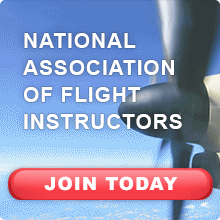| From NAFI's Chair |
Why Not Give a Gift Membership?I hope that all of you had a wonderful Thanksgiving. It's a wonderful time when family and friends gather in gratitude for all of the good things that have happened during the year. With the holiday season now upon us it's also when we start small conspiracies with one another to determine the best way to surprise family and friends with meaningful gifts to show our love and appreciation for them. You all know what I mean - "What should we get mom and dad?" or "Do you have any idea what my wife would like?" And, as always, it's not the gift, but the thought and caring behind it that really counts.One of the bigger struggles I've seen over the years is what to give your favorite flight instructor. Often the present ends up being a gift card to a local restaurant or a cash tip. Those are certainly nice, but that's something that anyone can give to anyone else, and not unique to someone who's in aviation. To help, NAFI has come up with a great stocking-stuffer for our members to use this year. Why not give a NAFI membership to one or more of your favorite CFIs? This truly is the gift that will keep on giving, with all of NAFI's great membership benefits, including the Professional Development Program, eMentor, Mentor magazine, and MentorLive, not to mention discounts and other benefits from NAFI sponsors. What a great way to show someone that you want to help them grow and be successful in their aviation career. We've made the process easy. Simply click this link and you'll be taken to an application form to complete. Be sure to have your recipient's email and address information available when you make the request. You can choose one, two, or three-year memberships as your gift. NAFI membership isn't limited to flight instructors, so if you know someone else who might benefit from NAFI's wealth of knowledge and experience, you may want to consider this gift for them as well. It might just be the nudge that an aspiring flight instructor needs to get going! No matter who receives your gift, they'll know you care about them, their success, and aviation in general. That's a pretty good investment, I'd say. Bob Meder,
NAFI Board Chair
|






